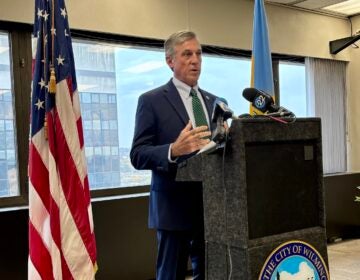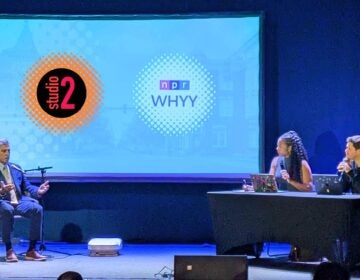Protesters demand action and Delaware politicians jump to enact policing reforms
Demonstrators in Wilmington and across the state have made their demands clear. A slate of bills in the General Assembly aims to meet them and more.
Listen 1:57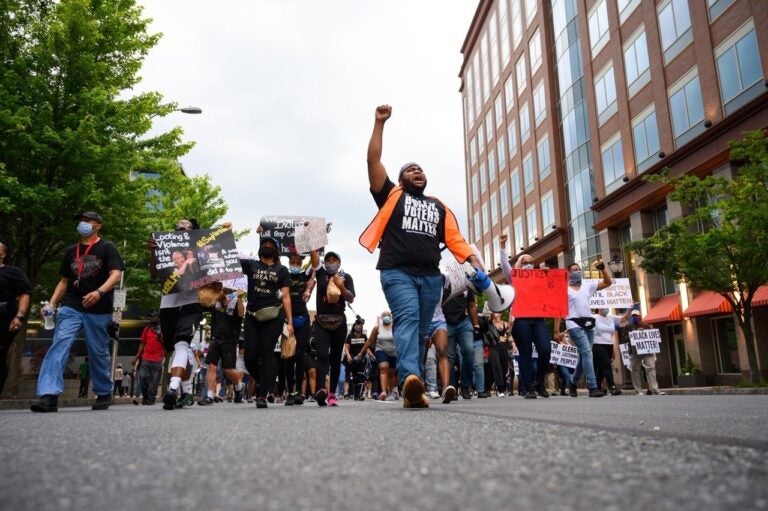
Coby Owens leads marchers through Wilmington, Delaware, during a June 2020 protest. (Courtesy of Coby Owens)
Chants of “Hands up, don’t shoot,” “Black Lives Matter,’’ and “Justice for all,” rang through Wilmington on Friday night, from the riverfront entertainment district to the steps of the city courthouse.
The protest, like most that have occurred up and down the state in recent weeks, was a boisterous yet peaceful event from start to finish. The way the event unfolded also was a welcome surprise for city residents, merchants and government officials who feared it might devolve into the looting that erupted downtown six nights earlier.
At the finale, protesters marched with police for 8 minutes, 46 seconds — the amount of time a Minneapolis police officer used a knee-on-neck hold that killed George Floyd.
Organizer Coby Owens said forceful order — not chaos — was his intention for the demonstration that Gov. John Carney and Mayor Mike Purzycki had urged him to cancel.
Owens, a 25-year-old who grew up in Wilmington, didn’t want the message to be muddled by bad behavior and imperil the change for reforms.
“We’re here for peaceful change and we’re here for actions,” Owens told WHYY this week on Market Street, where windows had been smashed and stores ransacked a week earlier.
Protesters want “body cams, review boards [but] that’s just the start of it,’’ Owens said. “Better pre-hiring, implementing screening for cops, better tracking system for cops who have had complaints and they’re going to a new department.
“[We want] for the review boards to actually have investigative powers and subpoena powers and [be able to] actually make recommendations on policies. It’s also to bring the community in, and have them work with the police in a better way. The relationship between the community and the police, it’s not the best right now.”
The protesters’ voices and actions have resonated in a big way with state and local leaders, who have been moved to action.
Mayor Purzycki, who is seeking a second four-year term this fall, says body cams will be bought without delay, at an initial cost of $800,000 to the cash-strapped city.
His administration will review police policies for possible changes and share more of the procedures with the public.
The mayor, along with City Council President Hanifa Shabazz, added that they support efforts to create an police review board – efforts that have been continually thwarted in Delaware’s largest city.
Purzycki, who is white, added that the death of Floyd and the protests hit home because he has an adopted Black teenage son and understands, to a degree, the “fears that Black parents have. I share some of those same anxieties. It’s not exactly the same by any stretch of the imagination, but it’s my kid going out in the car, going out in a boat, going out with a hoodie on.”
Purzycki cautioned, however, that while police reforms are long overdue and need to be made, they’re not a “simple stupid solution.” They are only part of what’s needed in a city gripped by poverty, gun violence and poor educational outcomes for its children.
“We’ve got schools to fix, neighborhoods to fix. Housing. Family. It’s got to be all-hands-on-deck to improve our neighborhoods,” the mayor said.
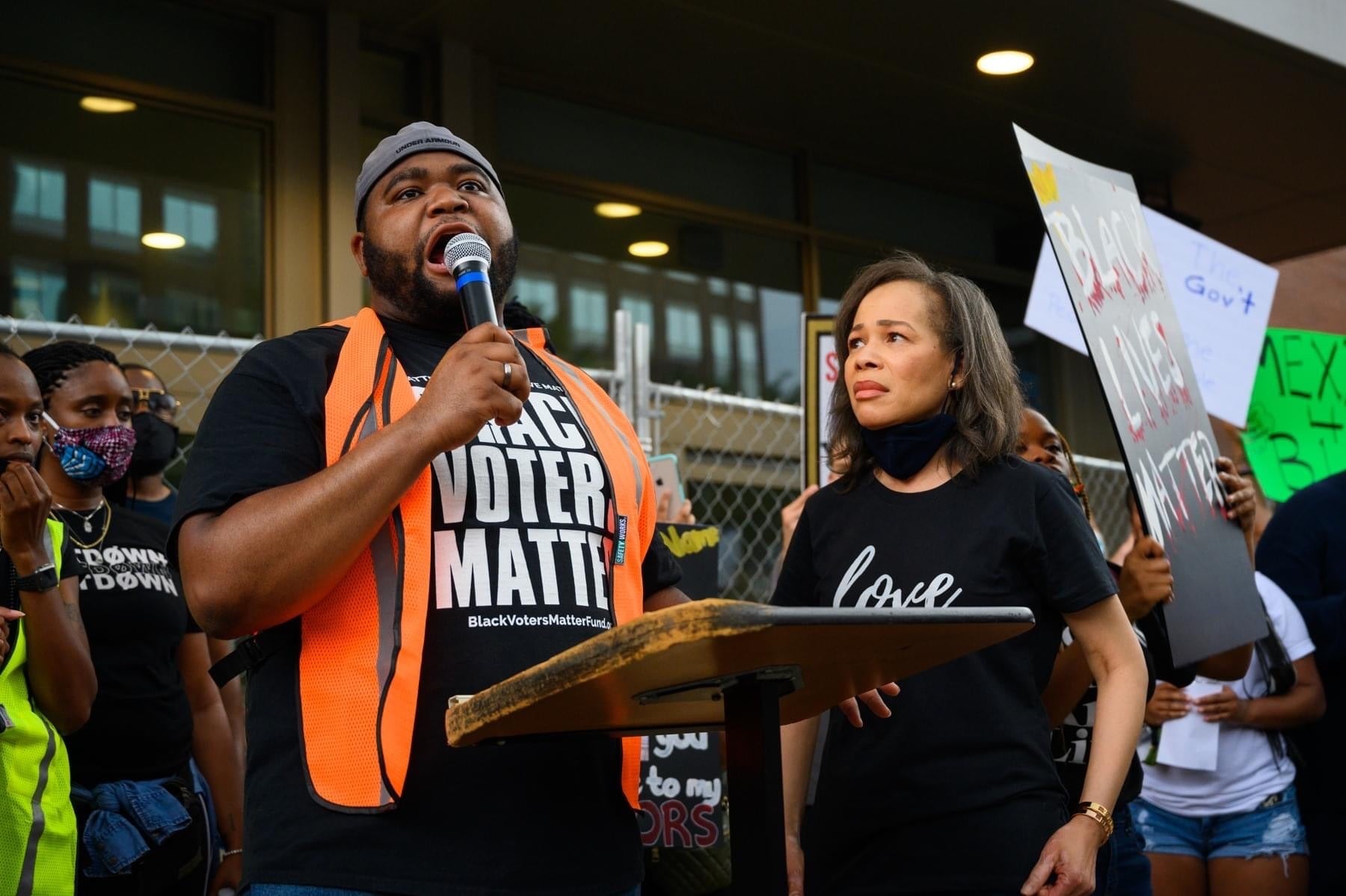
‘Legislative Black Caucus unveils reform agenda’
Beyond what reform might be coming specifically to Wilmington this week, the state’s Legislative Black Caucus unveiled an agenda of bills to improve policing statewide and accountability to the public.
Proposals include requiring body cams to be used by all police forces in a state where only a handful have them, and two of the big three – state police and Wilmington police – don’t. The other big force, New Castle County police, does use them.
Other bills on the slate include banning footholds and chokeholds, changing the Police Bill of Rights to give defendants and their lawyers access to police disciplinary records, and a constitutional ban on discrimination based on race, color or national origin.
At a rally Thursday in Dover, U.S. Rep. Lisa Blunt Rochester, Delaware’s top Black elected official, joined the caucus. She said many of the proposals mirror those she and others are pushing on the federal level.
“The people are speaking. They are speaking loudly and clearly that they want justice for all,’’ Rochester said. “This is beyond just policing. The issues that we need to deal with are deep and ingrained. They are foundational for our country and we need to dig deep.”
Legislative leaders in the Democrat-dominated General Assembly, including House Speaker Pete Schwartzkopf, a white former state trooper, and Franklin Cooke, a Black ex-New Castle County officer, also spoke at Thursday’s rally and said they support the goals of the caucus.
So did Carney and Attorney General Kathy Jennings, the state’s top law enforcement officer, also Democrats.
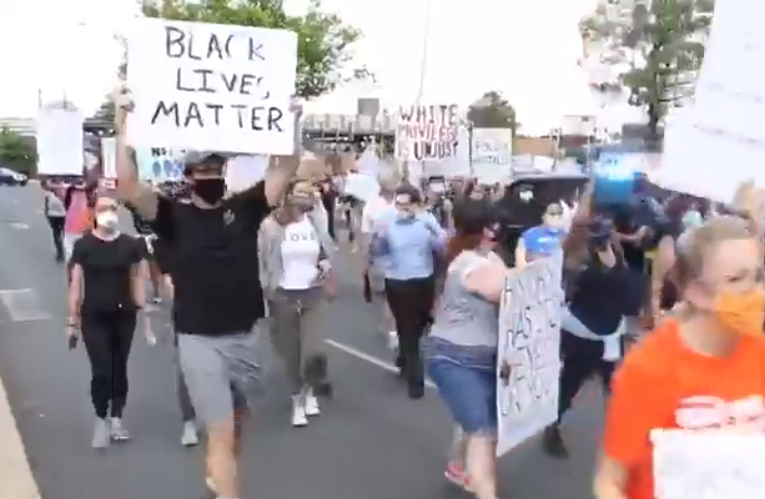
‘A strong sense of urgency’
Sen. Tizzy Lockman, a caucus member who represents a section of Wilmington, says lawmakers feel the need to act boldly, and now.
Lockman, who is biracial, said she was heartened to see white protesters walking side-by-side with Black demonstrators.
She called the marches all across Delaware and in big-city and small-town America “a significant turning point that will go down in history” as the time when people are not only saying, but showing, that they will no longer tolerate police brutality or racial injustice.
But even though legislative leaders in both the House and Senate are expressing support for changes, it’s uncertain how fast they will happen.
The General Assembly is only meeting virtually because of the coronavirus crisis and the current legislative session ends June 30 – in just 19 days. During that brief period lawmakers must also deal with pressing financial issues like a passing budget in a state whose revenues have been hard-hit by the pandemic and subsequent business shutdowns.
That’s hardly time for what could be contentious committee hearings and floor debates on issues in which the state’s powerful law enforcement lobby, both in the Legislature itself and the police unions, will surely want to have input.
Lockman says she and others will nevertheless press lawmakers to get some measures passed and the ball rolling on others before the gavel falls for the session.
“I’m ambitious right now,’’ Lockman said. “I feel a strong sense of urgency and I would love to see us push ourselves to do as much of our agenda sooner rather than later.”

Show your support for local public media
WHYY is your source for fact-based, in-depth journalism and information. As a nonprofit organization, we rely on financial support from readers like you. Please give today.



